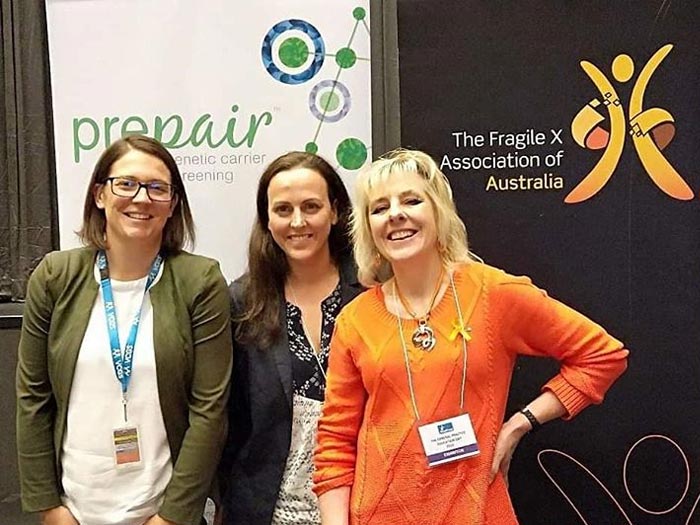Carrier screening is a genetic test that can tell people if they have an increased chance of having children with an inherited genetic condition. Our genes provide instructions for our bodies to grow, develop and function. We all carry changes in our genes, that’s what makes each of us unique. Sometimes a change in a gene can make the gene faulty, affecting the way that it works or stopping it from working at all.
Genetic conditions are caused by these genetic faults. Genetic carrier screening looks for these genetic faults and can tell people if they are carriers for genetic conditions.


It is thought that everyone is a genetic carrier for at least two inherited conditions. People who are carriers for genetic conditions are usually completely unaware they carry the condition/s.
Most people who are genetic carriers do not have anybody in their family with the genetic condition. For these reasons, it is recommended that healthcare providers offer genetic carrier screening to anybody planning a pregnancy or in early pregnancy.
Genetic carrier screening screens for inherited genetic conditions. These conditions are passed through families in certain ways which are called ‘autosomal recessive’ and ‘X linked’.
Autosomal recessive – Babies inherit one copy of each gene from each biological parent. If the parents are both carriers for a change in the same gene, there will be a 1 in 4 or 25% chance of having a child with the condition for each pregnancy. Most of the conditions screened through genetic carrier screening are autosomal recessive conditions. Common autosomal recessive conditions are: cystic fibrosis and spinal muscular atrophy.
X-linked – Some genetic conditions are caused by faults in genes on the X chromosome. A female who is a carrier for an X-linked condition will have up to a 25% chance of having a male child with the condition. For X linked conditions, it is usually the male who is affected but there are some conditions where a female who is a carrier for the condition may also have some symptoms. Fragile X syndrome is an example of a common X-linked condition. For X-linked conditions, only the female partner needs to be offered screening.
Genetic carrier screening is usually requested by general practitioners, obstetricians, fertility specialists, midwives, genetic counsellors or medical geneticists. Let your healthcare provider know that you wish to have genetic carrier screening. Your healthcare provider will need to complete a test request form.
Screening can be performed on one or both biological parents. Testing both parents at the same time will give the most informative result. If only one parent is screened, it is recommended that the female partner is screened as this will include screening for conditions on the X chromosome. Genetic carrier screening can be performed on blood or saliva samples. Carrier screening kits can be ordered online (click here to see list) and returned by mail to the genetic testing laboratory. We recommend you ask for your testing to be performed by a specialist genetic testing laboratory.
Download the Genetic Carrier Screening – How to be tested brochure
Depending on the screening you have, results will be available approximately 2-6 weeks after the sample was received by the laboratory. Results are issued to the healthcare provider who requested the screening. The healthcare provider will discuss the results and may make a referral for genetic counselling if the results show the couple has an increased chance of having a child with a genetic condition. If only one partner has been screened and is a genetic carrier, the healthcare provider will order carrier screening for the other partner to check whether they also carry that condition.
Download the Genetic Carrier Screening – If you find out you are a carrier brochure


Larger screening panels can include hundreds of genetic conditions. These include conditions which cause: shortened lifespan, intellectual disability, serious physical disability. For some of the conditions screened early treatment may substantially improve outcomes, for others, there is no cure or effective treatment or the treatment is very burdensome.
All genetic carrier screening panels include three of the most common inherited conditions:
SMA is a condition that affects nerves in the spinal cord and causes muscles to get weaker. There are four types of SMA with SMA type 1 being the most common and the most severe. Babies with SMA type 1 have weak muscles from birth and usually do not live past two years of age. There is no cure for SMA but new treatments are showing promise in improving symptoms and quality of life.
Larger screening panels can include hundreds of genetic conditions. These include conditions which cause: shortened lifespan, intellectual disability, serious physical disability. For some of the conditions screened early treatment may substantially improve outcomes, for others, there is no cure or effective treatment or the treatment is very burdensome.

FXS is the most common cause of inherited intellectual disability. People with FXS can have delayed development, learning difficulties, anxiety, autism and epilepsy. The features of FXS vary from mild to severe with males more likely to be severely affected than females. There is no cure for FXS although some educational, behavioural and medical interventions can improve outcomes for people with FXS. Some females who are carriers of FXS may have early menopause.

CF is an inherited condition affecting breathing and digestion. CF causes thick mucus which traps bacteria, resulting in recurrent infections that damage the lungs. Thick mucus in the gut also makes digestion of food difficult. Infants, children and adults with CF require daily chest physiotherapy to clear mucus from their lungs, frequent courses of antibiotics, and need to take medicine to help with digestion. CF is a life shortening condition. There is no cure, but better treatments are being developed.

Genetic carrier screening is becoming increasingly available in Australia. There are a variety of carrier screening options which include:
If both parents are carriers for the same autosomal recessive condition or the female partner is a carrier for an X-linked condition, the couple therefore have an increased chance of having a child with a genetic condition. Genetic counselling is recommended. Depending on the genetic screening service used, genetic counselling may be available through that service. Alternatively, a healthcare provider can refer the couple to a local clinical genetics service.
Genetic counselling involves speaking to an expert in genetics about what the results mean and family planning options available to them. Some people may choose to avoid having a child with the genetic condition whereas others may choose not to alter their path. These choices are entirely up to the couple, and genetic counselling services can support them in making these decisions.
A number of options are available to people who have an increased chance of having a child with a genetic condition. For those who are pregnant, genetic testing can be done during early pregnant to see if the fetus has the condition. If this testing diagnoses the condition, the parents have a choice about whether to plan for the birth of a baby with the condition or to have a termination of pregnancy. If the couple are not yet pregnant, there are a range of family planning options available including in vitro fertilisation (IVF) with genetic testing of the embryos (known as pre-implantation genetic testing). Through genetic counselling couples will be given detailed information and supported to consider which options are right for them.
Genetic counselling also involves speaking about what the genetic screening results might mean for blood relatives. It is important that blood relatives are told about these genetic screening results so that they can access screening themselves if they choose.
If a person or a couple receive a ‘low risk’ or ‘negative’ result from genetic carrier screening, this means they have a low chance of having a child with a genetic condition. Genetic testing technologies detect the majority of carriers but cannot detect every gene change that causes these conditions. If no gene change is found, there is still a small chance for each condition that the person is a carrier of a rarer gene change that has not been detected.
Although carrier screening is relevant to everyone, it is especially important for those who have a family history of a genetic condition. People with a family history should let their healthcare provider know prior to screening and the healthcare provider should include the family history information (including the specific family gene fault if known) on the test request form so that the testing laboratory can ensure the appropriate testing is being performed.
For most of the conditions screened through genetic carrier screening, carriers do not develop symptoms. However for some genetic conditions, carriers may experience health effects. In these situations, it is recommended that carriers for these conditions are referred for genetic counselling to discuss their results further.
If you have specific questions about genetic carrier screening, we suggest you contact a specialist genetic testing provider and ask to speak to a genetic counsellor.
If you would like to know more about a specific genetic condition please contact:
or contact us via the form below:
Below is a list of companies offering genetic carrier screening in Australia. The screening options vary in relation to what conditions are screened, cost and whether genetic counselling is provided. Anyone considering having genetic carrier screening should discuss their options with their GP, obstetrician, or a genetics health professional, who can provide further information and guidance.
SONIC GENETICS
EUGENE
AUSTRALIAN CLINICAL LABS
GENOMIC DIAGNOSTICS
VIRTUS DIAGNOSTICS
GENETIC CLINICS AUSTRALIA
This information is intended as a guide only, and does not endorse any particular company.
Australian genetic carrier screening providers wanting to be on this list can contact us via the form located at the bottom of this website.